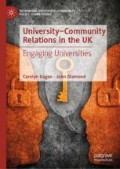Abstract
This chapter establishes the foundation for university–community engagement by examining the contested nature of community, and the ways in which universities have developed over time. The discussion goes on to consider the characteristics and principles of engagement and engaged scholarship and the importance of place, in order to end with the question of why engage? The roles of reciprocity and mutuality are argued to be core principles of engagement, which is seen more as an organising process for university activity, rather than a set of discrete activities.
Access this chapter
Tax calculation will be finalised at checkout
Purchases are for personal use only
References
AASCU. 2002. Stepping Forward as Stewards of Place: A Guide for Leading Public Engagement in State Colleges and Universities. Washington: ASSCU. https://www.aascu.org/WorkArea/DownloadAsset.aspx.
Benneworth, P. 2013. “University Engagement with Socially Excluded Communities: Toward the Idea of the ‘Engaged University.’” In University Engagement with Socially Excluded Communities, 3–32. New York: Springer.
Bjarnason, S., P. Coldstream, and Association of Commonwealth Universities. 2003. The Idea of Engagement: Universities in Society. London: Association of Commonwealth Universities.
Boyer, E.L. 1996. “The Scholarship of Engagement.” Bulletin of the American Academy of Arts and Sciences 49 (7): 11–20.
Carnegie Foundation for the Advancement of Teaching. 2007. Community Engagement Elective Classification. www.carnegiefoundation.org/classifications/index.asp?key=1213.
CERI. 1982. The University and the Community: The Problems of Changing Relationships. Paris: Centre for Educational Research and Innovation, OECD.
Collini, S. 2012. What Are Universities For? London: Penguin books.
Consortium. 2015. Factors Affecting Public Engagement by Researchers. Reflections on the Changing Landscape of Public Engagement by Researchers in the UK. Consortium of UK Public Funders of Research. London: Wellcome Trust. https://wellcome.ac.uk/sites/default/files/wtp060034.pdf.
Conway, C., L. Humphrey, P. Benneworth, D. Charles, and P. Younger. 2009. Characterising Modes of University Engagement with Wider Society: A Literature Review and Survey of Best Practice. University of Newcastle, Office of the Vice Chancellor, Newcastle. http://strathprints.strath.ac.uk/48210/.
Denham, B.D. 2005. “What Is the University in the 21st Century?” Higher Education Management and Policy 17 (2): 9–26.
Doberneck, D.M., C.R. Glass, and J.H. Schweitzer. 2009. Scholarly Outreach and Engagement Reported by Successfully Tenured Faculty at Michigan State University, 2002–2006: A Typology of Publicly Engaged Scholarship. East Lansing. Michigan State University, National Center for the Study of University Engagement.
———. 2010. “From Rhetoric to Reality: A Typology of Publically Engaged Scholarship.” Journal of Higher Education Outreach and Engagement 14 (4): 5.
Duggan, K., and C. Kagan. 2007. ‘We Don’t Believe You Want a Genuine Partnership’: Universities’ Work with Communities. Manchester: RIHSC. https://www.publicengagement.ac.uk/sites/default/files/publication/we_dont_believe_you_want_a_genuine_partnership.pdf.
Duncan, S., P. Manners, and C. Wilson. 2014. Building an Engaged Future for UK Higher Education Summary Report from the Engaged Futures Consultation. Bristol: National Co-ordinating Centre for Public Engagement.
Farrar, M., and R. Taylor. 2010. “University-Community Engagement: Analysing an Emerging Field.” In A Practical Guide for University and College Management., edited by S. Denton and S. Brown, 247–265. London: Routledge.
Fitzgerald, H.E., K. Bruns, S.T. Sonka, A. Furco, and L. Swanson. 2012. “The Centrality of Engagement in Higher Education.” Journal of Higher Education Outreach and Engagement, 16 (3): 7–28.
Goddard, J. 2009. Reinventing the Civic University. Provocation 12. London: NESTA.
Goddard, J., and J. Puukka. 2008. “The Engagement of Higher Education in Regional Development: An Overview of the Opportunities and Challenges.” Higher Education Management and Policy 20 (2): 11–38.
Hart, A., S. Northmore, and C. Gerhardt. 2008. “Auditing, Benchmarking and Evaluating University Public Engagement”. Briefing Paper Commissioned by The National Co-Ordinating Centre for Public Engagement. NCCPE, Bristol.
Hart, A., and D. Wolff. 2006. “Developing Local ‘Communities of Practice’ through Local Community-University Partnerships.” Planning, Practice and Research 21 (1): 121–138.
Hooper, D. 2016. Supporting Thriving Communities: The Role of Universities in Reducing Inequality. London: University Alliance.
Howells, J., R. Ramlogan, and S.L. Chen. 2008. “The Role, Context and Typology of Universities and Higher Education Institutions in Innovation Systems: A UK Perspective.” Impacts of Higher Education Institutions on Regional Economics: A Joint Research Initiative. Discussion Papers and Project Reports. Online. https://ewds.strath.ac.uk/impact/PresentationsPublications/DiscussionPapers.aspx.
Kagan, C., and M. Burton. 2010. “Marginalization.” In Community Psychology: In Pursuit of Wellness and Liberation., edited by G. Nelson and I. Prilleltensky, 2nd edition. London: MacMillan/Palgrave.
Kellog Commission. 1999. Returning to Our Roots: The Engaged Institution. Washington: National Association of State Universities and Land Grant Colleges. http://www.aplu.org/library/returning-to-our-roots-the-engaged-institution/file.
Laing, S., and E. Maddison. 2007. “The CUPP Model in Context.” In Community-University Partnerships in Practice, edited by A. Hart, E. Maddison, and D. Wolff, 8–20. Leicester: NIACE.
Pearce, J., M. Pearson, and S. Cameron. 2008. “The Ivory Tower and Beyond. Bradford University at the Heart of Its Communities.” Participatory Learning and Action 58 (June): 82–86.
Perry, B., and M. Harloe. 2005. “Rethinking Or Hollowing Out The University?” Higher Education Management And Policy 17 (2): 29–42.
Scott, P. 2013. “University Mission Groups: What Are They Good For?” The Guardian, 2013, 4 March edition. https://www.theguardian.com/education/2013/mar/04/university-mission-groups-comment.
UPBEAT. n.d. “Real World: An UPBEAT Approach to Academic Enterprise.” University of Salford. https://d14ujlzb3m57xe.cloudfront.net/sites/default/files/upbeat_brochure.pdf.
Viewforth Consulting. 2017a. “Measuring the Difference: Social and Economic Impact Report 2016/2017.” Manchester: University of Manchester, Office for Social Responsibility. http://documents.manchester.ac.uk/display.aspx?DocID=32801.
———. 2017b. “Measuring the Economic and Social Impact of the University of Westminster.” London: University of Westminster. https://www.westminster.ac.uk/about-us/our-university/corporate-social-responsibility.
Watson, D., R.M. Hollister, S.E. Stroud, and S. Babcock. 2011. The Engaged University: International Perspectives on Civic Engagement. New York: Routledge.
Weiss, B. 2016. “The Rise of Social Responsibility in Higher Education.” University World News, 2016. http://www.universityworldnews.com/article.php?story=20160811095808959.
Author information
Authors and Affiliations
Corresponding author
Rights and permissions
Copyright information
© 2019 The Author(s)
About this chapter
Cite this chapter
Kagan, C., Diamond, J. (2019). Foundations of University–Community Engagement. In: University–Community Relations in the UK. Rethinking University-Community Policy Connections. Palgrave Macmillan, Cham. https://doi.org/10.1007/978-3-030-12984-2_1
Download citation
DOI: https://doi.org/10.1007/978-3-030-12984-2_1
Published:
Publisher Name: Palgrave Macmillan, Cham
Print ISBN: 978-3-030-12983-5
Online ISBN: 978-3-030-12984-2
eBook Packages: Political Science and International StudiesPolitical Science and International Studies (R0)

